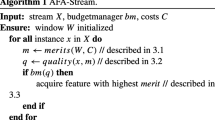Abstract
Replacing missing features in data streams is an important task in order to enable many machine learning algorithms that require feature-complete instances for training and prediction. Two popular methods for dealing with missing features are imputation and active feature acquisition, where in the former missing values are approximated, whereas in the latter, missing features are provided by an expert for a cost and within a limited budget. In this work, we present a hybridized approach, where we employ an active feature acquisition method in the first stage to pick candidate features on which we would require a costly expert and then check in a second stage how well we could impute these candidate features. If the imputation is expected to be of a certain quality, we skip the purchase and impute instead. We provide a framework for such a scenario and used it to run extensive experiments. Our results on 6 data sets show that our proposed method can achieve a similar classification performance while spending 1% to 27% less budget.
Shared first author position.
Access this chapter
Tax calculation will be finalised at checkout
Purchases are for personal use only
Similar content being viewed by others
References
Adhikari, D., et al.: A comprehensive survey on imputation of missing data in internet of things. ACM Comput. Surv. 55(7), 77–114 (2022)
Beyer, C., Büttner, M., Unnikrishnan, V., Schleicher, M., Ntoutsi, E., Spiliopoulou, M.: Active feature acquisition on data streams under feature drift. Ann. Telecommun. 75, 597–611 (2020)
Büttner, M., Beyer, C., Spiliopoulou, M.: Reducing missingness in a stream through cost-aware active feature acquisition. In: 2022 IEEE 9th International Conference on Data Science and Advanced Analytics (DSAA), pp. 1–10 (2022)
Dong, W., Gao, S., Yang, X., Yu, H.: An exploration of online missing value imputation in non-stationary data stream. SN Comput. Sci. 2, 1–11 (2021)
Dua, D., Graff, C.: UCI machine learning repository (2017)
Gama, J., Sebastiao, R., Rodrigues, P.P.: On evaluating stream learning algorithms. Mach. Learn. 90, 317–346 (2013)
Gomes, H.M., de Mello, R.F., Pfahringer, B., Bifet, A.: Feature scoring using tree-based ensembles for evolving data streams. In: 2019 IEEE International Conference on Big Data (Big Data), pp. 761–769. IEEE (2019)
Hallaji, E., Razavi-Far, R., Saif, M.: DLIN: deep ladder imputation network. IEEE Trans. Cybern. 52(9), 8629–8641 (2021)
Herbold, S.: Autorank: a python package for automated ranking of classifiers. J. Open Source Softw. 5(48), 2173 (2020)
Huang, S.J., Xu, M., Xie, M.K., Sugiyama, M., Niu, G., Chen, S.: Active feature acquisition with supervised matrix completion (2018)
Kachuee, M., Goldstein, O., Kärkkäinen, K., Darabi, S., Sarrafzadeh, M.: Opportunistic learning: budgeted cost-sensitive learning from data streams. In: 7th International Conference on Learning Representations, ICLR 2019, New Orleans, LA, USA, 6–9 May 2019. OpenReview.net (2019)
Keerin, P., Boongoen, T.: Improved KNN imputation for missing values in gene expression data. Comput. Mater. Contin. 70(2), 4009–4025 (2021)
Kottke, D.: Budget Optimization for Active Learning in Data Streams. Master’s thesis, Otto von Guericke University Magdeburg, Germany (10 2014)
Li, Y., Oliva, J.: Active feature acquisition with generative surrogate models. In: International Conference on Machine Learning, pp. 6450–6459. PMLR (2021)
Lin, W.C., Tsai, C.F.: Missing value imputation: a review and analysis of the literature (2006–2017). Artif. Intell. Rev. 53, 1487–1509 (2020)
Melville, P., Saar-Tsechansky, M., Provost, F., Mooney, R.: Active feature-value acquisition for classifier induction. In: Fourth IEEE International Conference on Data Mining (ICDM’04), pp. 483–486. IEEE (2004)
Peng, T., Sellami, S., Boucelma, O.: IoT data imputation with incremental multiple linear regression. Open J. Internet Things (OJIOT) 5(1), 69–79 (2019)
Ramanan, N., Odom, P., Kersting, K., Natarajan, S.: Active feature acquisition via human interaction in relational domains. In: Proceedings of the 6th Joint International Conference on Data Science & Management of Data (10th ACM IKDD CODS and 28th COMAD), pp. 70–78. Association for Computing Machinery, New York, NY, USA (2023)
Saar-Tsechansky, M., Melville, P., Provost, F.J.: Active feature-value acquisition. Manag. Sci. 55(4), 664–684 (2009)
Settles, B.: Active learning literature survey. Technical report 1648, University of Wisconsin-Madison Department of Computer Sciences (2009)
Shim, H., Hwang, S.J., Yang, E.: Joint active feature acquisition and classification with variable-size set encoding. In: Bengio, S., Wallach, H., Larochelle, H., Grauman, K., Cesa-Bianchi, N., Garnett, R. (eds.) Advances in Neural Information Processing Systems, vol. 31. Curran Associates, Inc. (2018)
Tharwat, A., Schenck, W.: A survey on active learning: state-of-the-art, practical challenges and research directions. Mathematics 11(4) (2023)
Yuan, L., Pfahringer, B., Barddal, J.P.: Iterative subset selection for feature drifting data streams. In: Proceedings of the 33rd Annual ACM Symposium on Applied Computing, SAC 2018, Pau, France, 09–13 April 2018, pp. 510–517 (2018)
Zhang, P., Zhu, X., Tan, J., Guo, L.: SKIF: a data imputation framework for concept drifting data streams. In: Proceedings of the 19th ACM International Conference on Information and Knowledge Management, pp. 1869–1872 (2010)
Author information
Authors and Affiliations
Corresponding author
Editor information
Editors and Affiliations
Rights and permissions
Copyright information
© 2023 The Author(s), under exclusive license to Springer Nature Switzerland AG
About this paper
Cite this paper
Büttner, M., Beyer, C., Spiliopoulou, M. (2023). Joining Imputation and Active Feature Acquisition for Cost Saving on Data Streams with Missing Features. In: Bifet, A., Lorena, A.C., Ribeiro, R.P., Gama, J., Abreu, P.H. (eds) Discovery Science. DS 2023. Lecture Notes in Computer Science(), vol 14276. Springer, Cham. https://doi.org/10.1007/978-3-031-45275-8_21
Download citation
DOI: https://doi.org/10.1007/978-3-031-45275-8_21
Published:
Publisher Name: Springer, Cham
Print ISBN: 978-3-031-45274-1
Online ISBN: 978-3-031-45275-8
eBook Packages: Computer ScienceComputer Science (R0)




